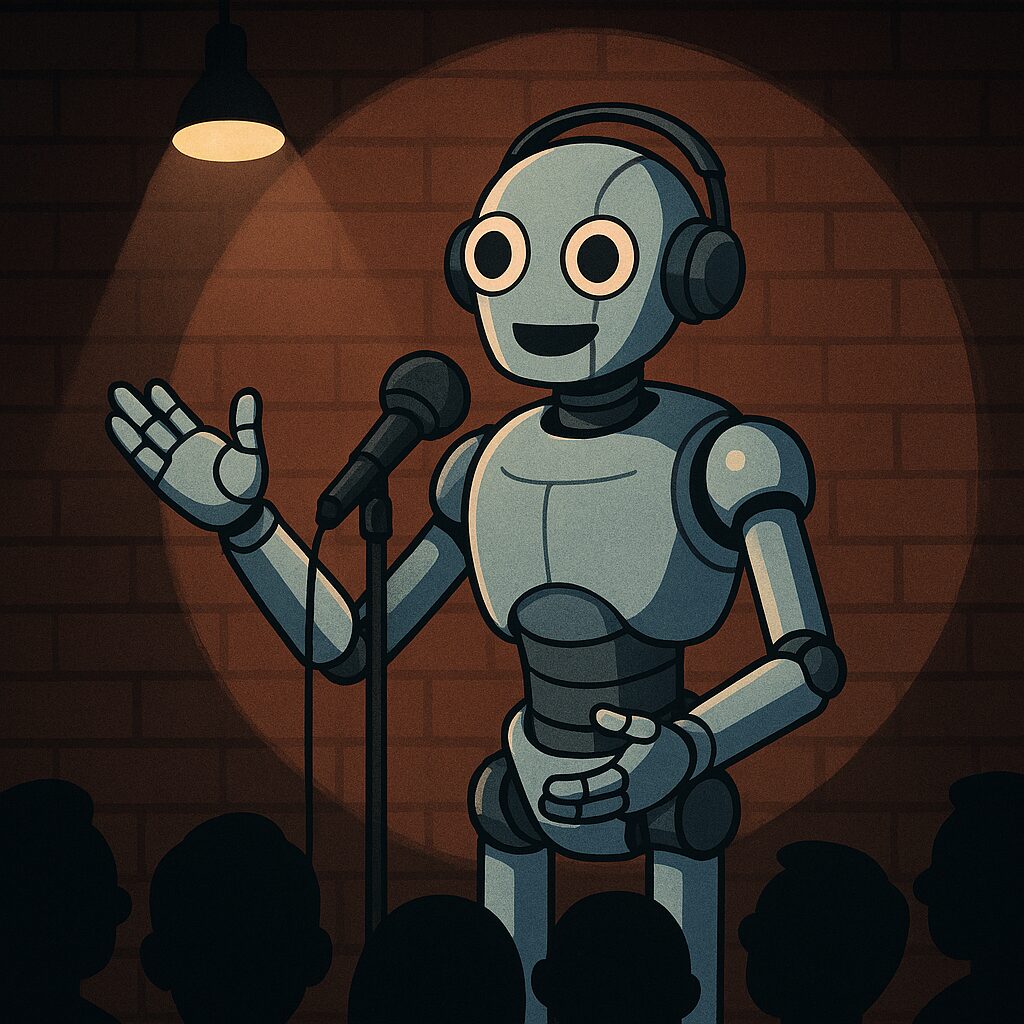Introduction
Artificial intelligence has conquered chess, mastered language translation, and even composed symphonies. But can it make us laugh? In 2025, the rise of AI stand-up comedians is challenging one of humanity’s most elusive skills: humor. From scripted punchlines to real-time crowd interaction, AI is stepping onto the comedy stage—and audiences are divided.
This article explores the technology behind AI humor, its successes and limitations, and whether robots can ever truly be funny.
🤖 What Is an AI Stand-Up Comedian?
An AI stand-up comedian is a machine learning model trained to generate jokes, perform routines, and interact with audiences. These systems use:
- 🧠 Natural Language Processing (NLP) to understand and generate punchlines
- 🎭 Sentiment analysis to gauge audience reactions
- 📊 Joke databases and comedic timing algorithms
- 🎙️ Voice synthesis and avatar animation for stage presence
Some AI comedians perform live via avatars or robots, while others generate scripts for human performers.
🎬 Real-World Examples of AI Comedy
| Project | Description |
|---|---|
| 🤖 Jon the Robot | A robotic comedian tested by Oregon State University in live stand-up sets |
| 💬 ChatGPT Joke Trials | AI models asked to generate 1,000+ jokes—90% were repetitive or cliché |
| 🎥 AI 4 Laughs (YouTube) | A digital comedian named Jess performs scripted sets with mixed audience reactions |
| 🎤 TED Talk by Jena Friedman | Explores why AI struggles with subversive, contextual humor |
While AI can mimic joke structure, it often lacks originality, timing, and cultural nuance.
🧪 Why Humor Is Hard for AI
Humor is one of the most complex human traits. It relies on:
- 🧍♂️ Context and timing
- 🧠 Emotional intelligence
- 🧬 Cultural references and subtext
- 🎭 Surprise, irony, and absurdity
AI lacks lived experience, making it difficult to understand what’s funny versus what’s merely clever. Studies show that most AI-generated jokes fall flat or repeat common tropes.
⚖️ Can Robots Ever Be Truly Funny?
The answer depends on how we define “funny”:
- ✅ Technically Funny: AI can replicate joke formats and deliver punchlines
- ❌ Emotionally Funny: AI struggles with satire, sarcasm, and improvisation
- 🤷 Unintentionally Funny: AI often amuses by misunderstanding context—like a robotic “straight man” in a sketch
Some experts argue that humor requires subjectivity, vulnerability, and risk—qualities machines don’t possess.
🔮 The Future of AI Comedy
Despite limitations, AI comedy is evolving. Future innovations may include:
- 🧠 Emotion-aware joke delivery
- 🎙️ Real-time crowd feedback loops
- 🌍 Multilingual humor adaptation
- 🤖 Hybrid shows with human-AI duos
AI may not replace comedians, but it could become a tool for joke writing, audience analysis, and performance enhancement.
🌐 SEO Optimization Summary
✅ Meta Title: “AI Stand-Up Comedians: Can Robots Be Funny?” ✅ Meta Description: “Explore the rise of AI stand-up comedians and whether artificial intelligence can truly master humor. Discover the tech, trials, and future of robotic comedy.” ✅ Keywords: AI comedians, robot stand-up comedy, artificial intelligence humor, funny AI jokes, ChatGPT comedy, Jon the Robot, AI-generated jokes ✅ Formatting Tips:
- Use structured headings (H1–H3)
- Include tables and bullet points for readability
- Embed alt text in visuals (e.g., “AI comedian performing on stage”)
- Keep paragraphs concise and keyword-rich
Conclusion
AI stand-up comedians are clever, curious, and occasionally hilarious—but they’re not quite human funny. As technology advances, machines may learn to mimic timing, tone, and delivery. But the soul of comedy—its chaos, vulnerability, and truth—remains uniquely human. For now, robots can write jokes. But only people can truly kill on stage.

